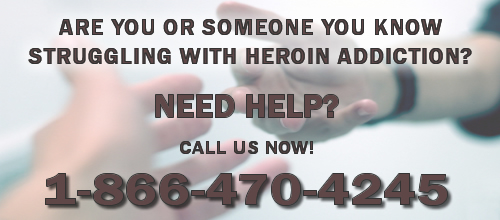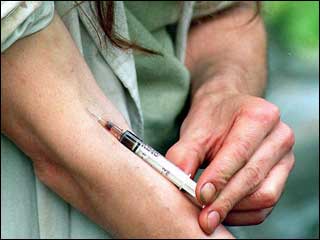Heroin Addiction
- Signs Of Heroin Addiction
- Heroin Addiction Treatment
- Heroin Addiction Withdrawal
- Heroin Addiction Detox
- Stages Of Heroin Addiction
Heroin Information
Heroin Effects

Heroin Addiction
Heroin addiction continues to be a major concern for society and the concern grows with every passing year. Not only does heroin addiction effect the addict himself, but also his loved ones and society as a whole.
 According to the 2003 National Survey on Drug Use and Health, 3.7 million people had used heroin at some time in their lives, and over 119,000 of them reported using it within the month preceding the survey. An estimated 314,000 Americans used heroin in the past year, and the group that represented the highest number of those users were 26 or older.
According to the 2003 National Survey on Drug Use and Health, 3.7 million people had used heroin at some time in their lives, and over 119,000 of them reported using it within the month preceding the survey. An estimated 314,000 Americans used heroin in the past year, and the group that represented the highest number of those users were 26 or older.
Heroin is an extremely dangerous drug and has been proven to be one of the most addictive, with herion addicts relapsing more than any other drug. Once a person becomes addicted to heroin, it is very difficult to overcome since it causes both psychological and physical dependence. Heroin Addiction causes the person to have no other goal in life other than to use more Heroin. This obsession to getting more of the drug results in the heroin addict stealing from friends and family members, neglecting their job or family, or even wandering off for days or weeks at a time on a 'binge'. The result of heroin addiction behavior is the loss of friends and family, leading to upset and anger for all involved. Heroin addiction also continues to destroy millions of lives not only by means of addiction, but overdose and death.
One of the main reasons heroin addiction is so difficult to overcome is because of the physical aspect of dependance and the withdrawal symptoms. Once addicted, the heroin user will experience severe physical withdrawal symptoms when he stops using the drug. The heroin addict will have severe drug cravings, headaches, nausea, vomiting, diarrhea, cold flashes, muscle pains, and overall flu-like symptoms. These withdrawal symptoms can begin within a few hours after the heroin addicts last dose. At this point, the heroin addict will desperately seek his next high or "fix" to avoid these uncomfortable and painful symptoms of withdrawal.
The path to heroin addiction often starts with experimentation. The individual may first try heroin out of curiosity, because friends were doing it, or in an effort to avoid or erase another problem. At first, the heroin seems to solve the problem or make life better, so he continues to use heroin more and more.
But as the heroin addiction progresses, getting and using the heroin becomes more and more important and the ability to stop using is compromised. What begins as a voluntary choice turns into a physical and psychological need. The good news is that Heroin addiction is treatable. Like any other addiction, heroin addiction can be treated and with the proper care and a positive and determined attitude, sobriety can be achieved.
Many different forms of treatment are available for heroin addiction, but research has shown that long term treatment for heroin has an overwhelmingly better outcome than short term treatment. Finding the right heroin addiction treatment for each individual need is imperative, making in depth research all the more important. We are here to help with that research and all information regarding heroin addiction and treatment. Please explore the rest of our links for information and resources. If you are concerned about someone else’s heroin addiction or your own, please fill out the form below and we will get back to you to discuss the specifics of your situation and available options for you. If there is anything we can assist you with in finding information or resources, please feel free to call us anytime, day or night. We are here to help.
